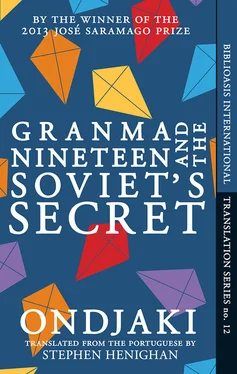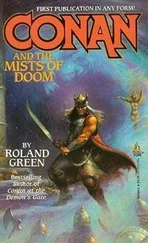Senhor Osório got out of the car even though Granma’s door was already open. He pulled his slacks up even higher, until his suspenders were completely limp, wiped his sweat with a white handkerchief and stood watching us while we entered the hospital.
“I’ve learned that I can’t give flores to the señorita ,”—Comrade Rafael was smiling—“but there is something I want to give her.”
This must have been the waiting room for the operations. Aunty Tó was there, already dressed in the really ugly green gown worn in operating rooms. A clapped-out old apparatus with pretenses to being a turntable and two columns stood on a shelf.
“If you will do me el honor. ..” Comrade Rafael KnockKnock made a gesture in the air with his hand. I figured it was for Granma to dance with him.
Granma Nhé accepted with a smile.
“I don’t know if I’m up to this, doctor.”
“ Sí , you are. Don’t worry. A last baile before the procedure.”
Music from the movies was playing. I already knew that sound, pretty and calm. Some nurses came to listen and stood still, watching while Granma danced with the doctor. Aunty Tó’s eyes were moist; I don’t know if she was afraid, or she simply felt like crying. With difficulty but in good spirits, Granma started to dance to that music from the past — then I knew what it was: a tango.
“That’s so that when you are better, bailamos again. You are going to see what beautiful trabajo we are going to do here. I just need you to be tranquila, Abuela. ”
“Thank you, doctor. I never thought I would dance a tango in the waiting room at the military hospital.”
“Life is full of sorpresas, señora Agnette.”
They were dancing as if time had stopped on all of the hospital’s clocks.
Other patients, in bed, on crutches, in filthy gowns, with tired eyes and dishevelled hair, with plasters on their arms, wearing grimy glasses, and other doctors in white and green gowns, even two security guards, came to take a good look at the dance that seemed to go on forever. Aunty Tó, her arms crossed, let her body bob from side to side; her eyes travelled far away. I can understand this: even I, being there, hearing that music, remembered a film I’d seen, the couple who danced in the film, a little more rapidly, it’s true, but it was also necessary to see that Granma had a wound in her toe and, with her steps, couldn’t twirl around any more than she was doing already.
“Now it’s time.” Comrade Rafael spoke gently as the music ended. “We are going to do our trabajo . One toe, nada más , I promise you. You will have nineteen digits left.”
Granma blew me a kiss from her hand as she smiled. I figure that the dancing had done her good, her face looked calmer and she even walked better.
As Sea Foam used to say, it was the miracle of music.
“My feet know the truth that my heart feels when my ears smile. Music is the miracle the Communists already authorized, ha-ha-ha! Let’s bailar, compañeros !”
Senhor Osório dropped me off on Bishop’s Beach. I couldn’t get that tango music out of my head. The Comrade Gas Jockey waved me goodbye and I stood at the gate of Granma Nhé’s house.
“How’s it goin’, everything okay?” 3.14 asked.
“Everything’s cool.”
“And your Granma?”
“She’s in the operating room.”
“Did you really go to the hospital?”
“I went. It’s a hospital where they play tango music before they operate on people.”
“Quit tellin’ fibs.”
“I swear. You can ask my Granma later.”
“Look, what are we gonna do now?”
“What do you mean? It’s almost lunchtime.”
“But didn’t we agree that we were going to take care of the marks on the sidewalks? Charlita’s already got some paint thinner.”
“You figure paint thinner’ll take it out?”
“Yeah, it takes it out. We already tried with one and it took it out.”
“Except they must know by heart the houses they want to dexplode.”
“Even so. This is just the beginning of our plan to slow them down. Afterwards, we have to find a way to do the rest.”
“The rest?”
“Just go have your lunch and we’ll meet afterwards. It’s a really risky plan, we can’t tell very many people about it.”
“But what kind of plan is it?”
“I figure we’re going to have to do things that the elders are never going to be able to find out about. Are you going to keep this secret?”
“Yes.”
“Me, too. Charlita promised, too. Just go eat. We’ll talk later.”
At the table, Madalena was serving tasty leftovers from the party to some cousins who had slept over. I told them all about the outing to the cemetery and nobody believed me, that beneath Granpa Mbinha’s headstone another person was buried there as if his neighbour, but that they were in the same plot, that I just couldn’t tell them the name because I hadn’t managed to read it. I also told them about Comrade Rafael KnockKnock and his waiting room tango playing and they called me a liar because neither the guards nor the Comrade Director would let music be played near the operating room. On top of that, Senhor Osório hadn’t stayed with us for lunch to confirm the situation.
“It’s obvious you’re making things up,” Madalena said. “Just shut up and eat so flies don’t get into your mouth.”
“You shut up. You never saw the military hospital or heard the tango.”
“You watch out, or I’ll tell about the wire cutters.”
“You watch out, or I’ll tell about the coarse salt.”
Madalena turned quiet and went into the kitchen. We ate quickly. I asked about Granma Catarina, but everyone remained silent. Afterwards I saw Madalena in the kitchen putting the rest of the leftovers into plastic bags.
“What are you doing that for, Madalena?”
“None of your business.”
I didn’t know why, if it was a holiday or what, or if there was a workers’ assembly, but the Mausoleum construction site was practically empty. Charlita and 3.14 had offered the guard who was on duty leftover vodka from the toe’s farewell party, which was even mixed with wine. The guard was soon snoring over on the beach, curled up against Rainboat.
The main gate was open, but 3.14 figured that it was better for us to go in on the other side, where there was already a hole in the metal grating.
We ran with our hearts beating really fast, and I didn’t even really know what the plan was.
“The plan is that we find all of the dynamite.”
“And then?”
“Then we hide it and they can’t blow up Bishop’s Beach.”
We entered the storage shed that smelled of mould and heard the noise of hens clucking. We took the lid off one box, then a second one, and the incredibly skinny hens stood watching us as though we were obliged to give them corn.
“It must not be here.”
“Wait, there’s a ton of boxes, it could be in the others.”
“Hey, 3.14, you guys are draggin’ those boxes all over the place. Are you sure they won’t dexplode on their own?”
“Didn’t you ever see a Trinità movie? Dynamite only dexplodes when you light the fuzz.”
“The fuse, you retard.”
We opened more boxes and they contained tiny little cages that hardly left the creatures inside space to budge. We all looked at one another: there were pretty birds of colours a person doesn’t often even have in his crayon set, those purple colours mixed with dark blue or toasted yellow, lots of tiny little birds with colourful beaks and a heap — and I mean a heap — of parrots that said words in really difficult Soviet.
Читать дальше












